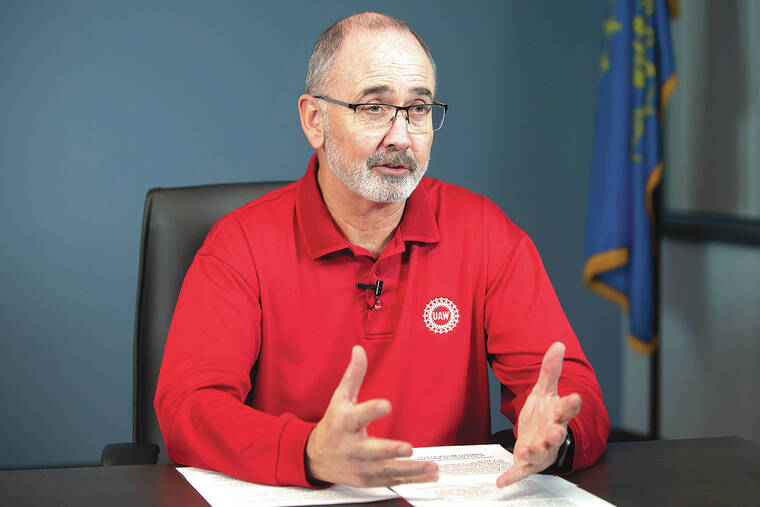Look inside the UAW’s work to organize transplants, EV autoworkers
After learning in 2020 that he and his fellow Honda Motor Co. Ltd. workers wouldn’t receive a summer bonus because of pandemic-induced plant shutdowns, Joab Scott launched the “Honda Associates United!” group on Facebook to discuss with coworkers the possibility of organizing his workplace in Marysville, Ohio.
That group today has more than 2,800 members. Most, Scott said, have joined in the past few months amid the United Auto Workers’ negotiations with the Detroit Three automakers, a 40-plus-day strike against all three, ratification votes of record contracts and now an unprecedented campaign launched last week seeking to double the UAW’s membership of 146,000 autoworkers and organize 13 non-union automakers, including Honda.
“I think people who had never given a thought to a union stopped and started thinking about a union,” said Scott, 50, of Chillicothe, Ohio, who’s worked at Honda for more than 17 years and is a member of the Marysville voluntary organizing committee, about the impact of this year’s talks. “There’s a definite change in attitude.”
That attitude isn’t limited to Honda workers in Ohio. Last week, the UAW said 30% of the workers at Volkswagen AG’s assembly plant in Chattanooga, Tenn., had signed cards expressing support for organizing. They’d join parts distribution workers at Nissan Motor Co. Ltd. in New Jersey who have organized.
UAW President Shawn Fain met with dozens of workers last week at Toyota Motor Corp.’s plant in Georgetown, Kentucky, and a Toyota manufacturing Facebook group is full of posts related to the UAW’s efforts. And earlier this year, the union won a card-check agreement from Sparkz, a California battery startup. They’re early signs of a stirring groundswell of support for the UAW among non-union automakers and suppliers.
The Detroit-based union will need to build on those signs of progress to reach its goal of having more than General Motors Co., Ford Motor Co. and Stellantis NV at the bargaining table come 2028. For decades, the UAW has failed to organize and maintain autoworkers at foreign-owned plants, often built in southern and right-to-work states and more conservative rural communities.
Over the years, the UAW represented workers at former transplant factories with ownership ties to Detroit automakers: Mazda Motor Corp.’s Flat Rock plant where Ford now builds the Mustang. The union also organized the shuttered NUMMI plant in California, a joint venture between then-General Motors Corp. and Toyota Motor Corp. In the ’70s and ’80s, it represented a VW plant in New Stanton, Pennsylvania, too.
Beginning in the 1980s, the union ceded its power, influence and a secure future as the Detroit Three lost market share to foreign competitors who built U.S. plants, primarily in the less union-friendly South. More recently, a years-long corruption scandal that sent two former UAW presidents, among others, to federal prison didn’t help.
UAW President Shawn Fain, though, says there’s hope now amid a building upswell in interest from autoworkers across the country. Days of vendor kickbacks, bribes and dues thefts “are over” following 18 convictions, he said.
The UAW won historic wage hikes, the restoration of cost-of-living adjustments and improved retirement contributions. Helping to set up those gains were under 4% unemployment, high rates of inflation, the highest public union support in decades, an openly pro-labor White House and a re-emphasis on work-life balance out of the pandemic. The union wants to strike while the moment is hot.
The campaign is already producing heat between the union and the companies. Last Monday, the UAW said it had filed federal labor charges against VW in Tennessee, Honda in Indiana and Hyundai Motor Co. in Alabama for alleged illegal union-busting activities amid organizing drives.
He knows his members would like greater financial security with company-sponsored health care coverage in retirement and pensions. Extending those benefits to workers without them would cost billions of dollars and further widen the gap in labor costs between the Detroit Three and its foreign and EV competitors. Having them all at the bargaining table would give the union more leverage.
“Working-class people in this country are fed up, so naturally, it’s a lot different than it has been in the past in that regard,” Fain told The Detroit News earlier this month at Solidarity House, the union’s Detroit headquarters. “We literally have thousands of non-union workers signing cards without really any effort at all from us right now. Workers have been reaching out by the thousands throughout this contract.”


